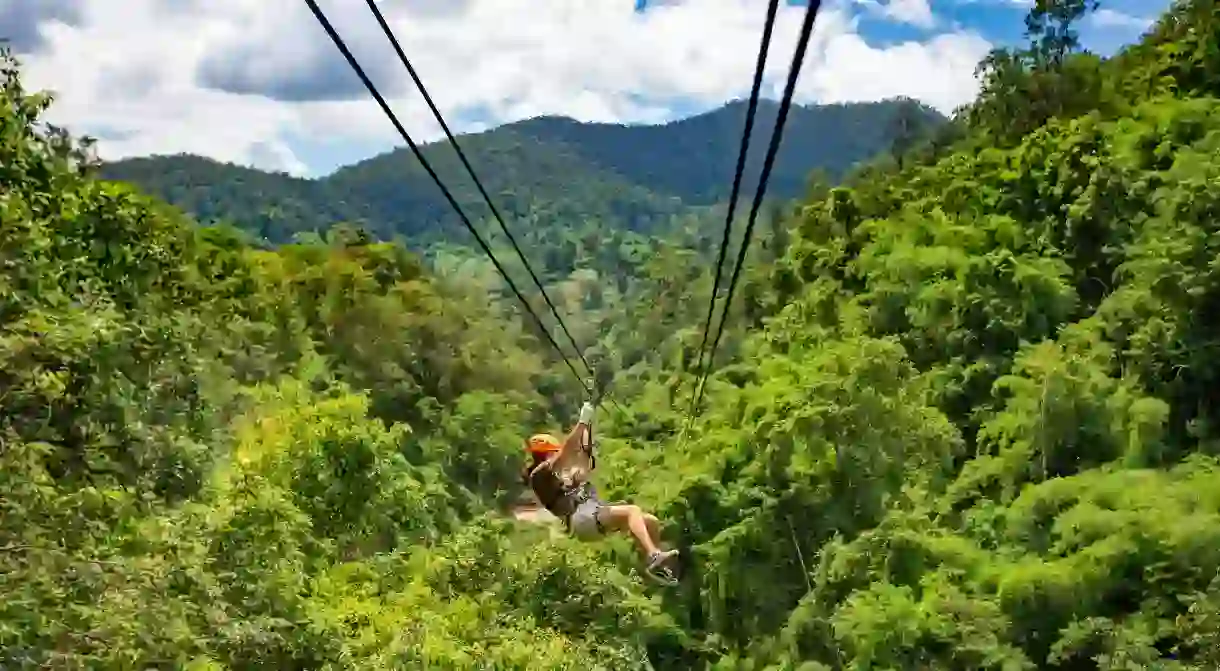The Best Ecotourism Experiences in Chiang Mai

When visiting Chiang Mai, check out these ecotourism activities that showcase the best of northern Thailand’s crown jewel. You can also see more of the region with our exhilarating exploration of the jungles Epic Trip.
Thailand’s rugged north is a land of sweeping jungle wilderness, hidden ancient cultures, panoramic mountain ranges and rare wildlife. As these areas become more open to tourism, however, travellers must consider their impact on local communities and the environment.
Elephant Nature Park
Natural Feature, Park

Mae Kampong

This small village of about 300 people is Thailand’s first “model homestay” community, with many residents offering tourists accommodation in their homes to learn about their lifestyle and culture. The town first sustained itself on its production of mieng, a local delicacy made from fermented tea leaves. As demand for the product waned over time, the local community recognized the value of its stunning nature and unique culture. Locals began managing an ecotourism community that ensures the sustainability of the area as well as the integrity of their culture, benefitting villagers and visitors alike.
Doi Inthanon National Park
Park

Ban Mae Chan Tai Agro-Tourism Centre
Natural Feature
This coffee plantation is led by young members of the local Akha hill tribe producing Akha Ama Coffee, an operation that has improved standards of living in the local area since its inception. Visitors can participate in the centre’s signature offering, A Coffee Journey, a three-day excursion into the Akha region’s culture and traditions.
Jim Thompson Farm
Museum, Park

Combining nature and culture with a dash of mystery and intrigue, Jim Thompson Farm is a great family-friendly eco-attraction in Nakhon Ratchasima. Many people may have heard of Jim Thompson, the American Thai silk expert who famously disappeared without a trace when walking in Malaysia’s Cameron Highlands. The farm tells the story of Mr. Thompson and provides insight into the production of delicate Thai silk. Silkworms and weaving looms aren’t all you’ll see here, though; the large farm has an organic vegetable and herb garden (where you can pick your own fresh produce), an impressive field of giant pumpkins, a maze and more.
Sopmoi-Mae Sariang

There are many treks to hill tribe villages offered around Chiang Mai’s city limits; however, many now suffer from over-tourism and the erosion of local culture. They also don’t often see financial gains from tourism, as the profits tend to float towards third-party retailers. The Sopmoi-Mae Sariang area enables visitors to experience this beautiful area in a more sustainable way. Smaller group sizes limit the impact on both the environment and integrity of the local way of life, generating a far more authentic experience for the traveller; any money you spend in the villages will remain there.
Flight of the Gibbon
Natural Feature

One of the best zipline courses in Asia — and the only one that flies with wild gibbons — Flight of the Gibbon has been a crowd-pleaser for years but has recently upped its attitude toward sustainability. The company, based just outside Mae Kampong, already held a respected presence for its management programs that reintroduce captive gibbons to the jungle but has expanded its scope to recognise its impact on the local community. Throughout areas like Mae Kampong, large adventure or tour operators often erode local cultures by replacing or undermining local economies and locals may need to leave to find employment or abandon traditional practices. Flight of the Gibbon, instead, employs much of its staff directly from the local community, even creating positions for those like traditional musicians, chefs and masseuses. To engrain the integrity of the local culture, the company also sets up projects with local artisans and craftsmen to help them continue their trade, which would otherwise be lost in many cases.
Borsang and Sankampang Villages

True ecotourism doesn’t just involve a responsible attitude towards the environment, but towards the local culture and traditions as well. Sankampang is a handicraft village, housing the local factories that produce silk, jewellery, teakwood carvings and other items that have been significant to the local culture and economy for generations.
Further on is Borsang, a sleepy rural town that’s famous for its handmade, meticulously painted paper umbrellas — an item that was once reserved for the upper classes of Thailand to protect fair skin from the sun. Borsang hosts an incredible Umbrella Festival each January, showcasing the artisan village’s prized skill.
The Panya Project
Natural Feature

This international community outside of Chiang Mai focuses on permaculture and entirely sustainable living. Visitors can learn about their processes through permaculture introduction and design courses, the construction of earthen buildings and demonstrations of its medium-scale water harvesting system. The area is situated in low-lying hills that are framed by rice paddies and national forests and tends to be a diverse “forest of food” with more than 40 varieties of fruit trees alone.
Trash Hero Chiang Mai

The global movement against single-use waste is firmly established in Thailand, largely thanks to the prevalence of grassroots, community-run chapters of groups like Trash Hero. Trash Hero Chiang Mai — comprised of locals and tourists alike — meets regularly to preserve the natural beauty of Chiang Mai and its surrounding areas. The group schedules clean-up runs for joggers, walkers and bikers to join and visits local schools to educate students on the values of sustainability. Check their Facebook page for details about what’s going on and how you can get involved during your time in Chiang Mai.
You can also travel to Chiang Mai with Culture Trip as part of our 10-day trip to Northern Thailand – carefully planned by our team of travel experts and led by trusted local insiders to bring you a hassle-free, 100% authentic experience.













